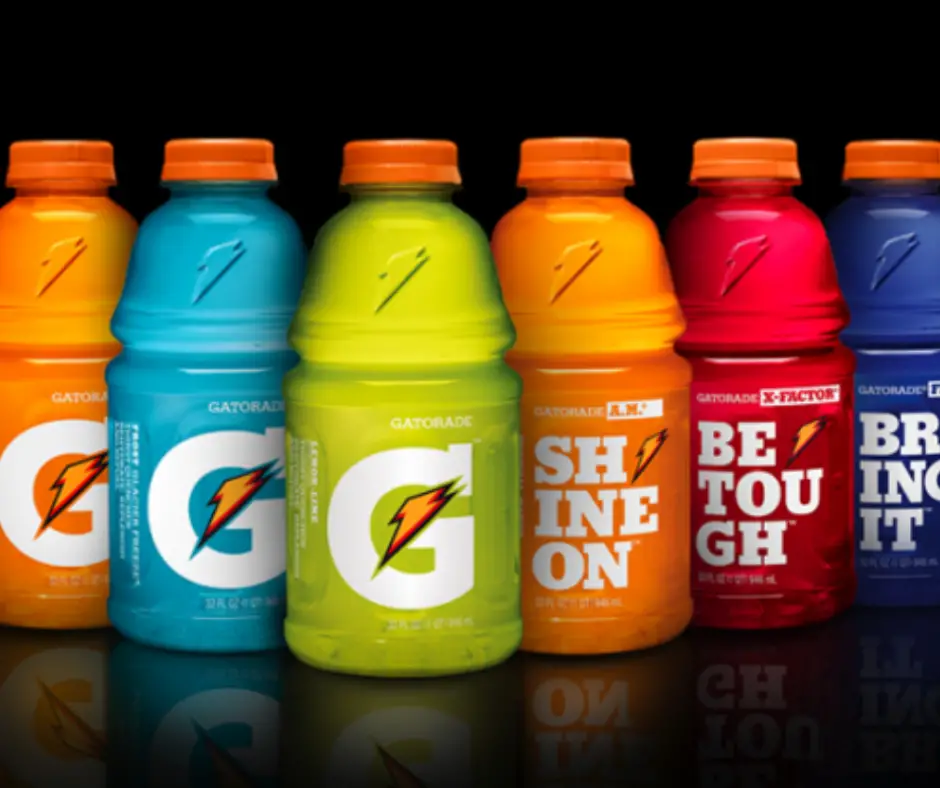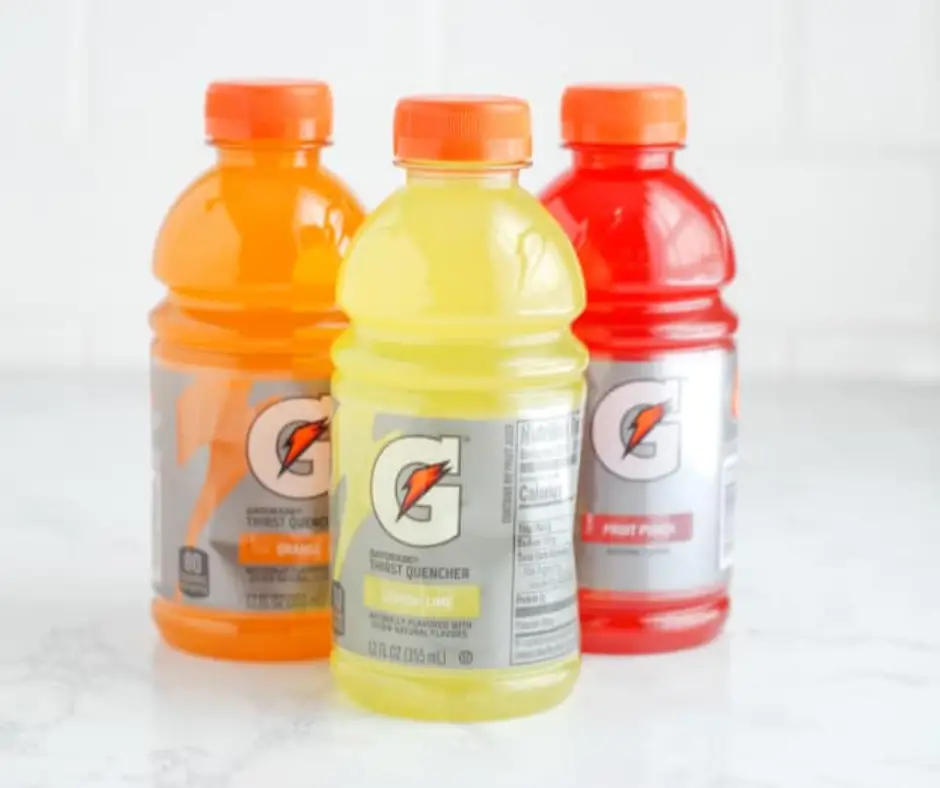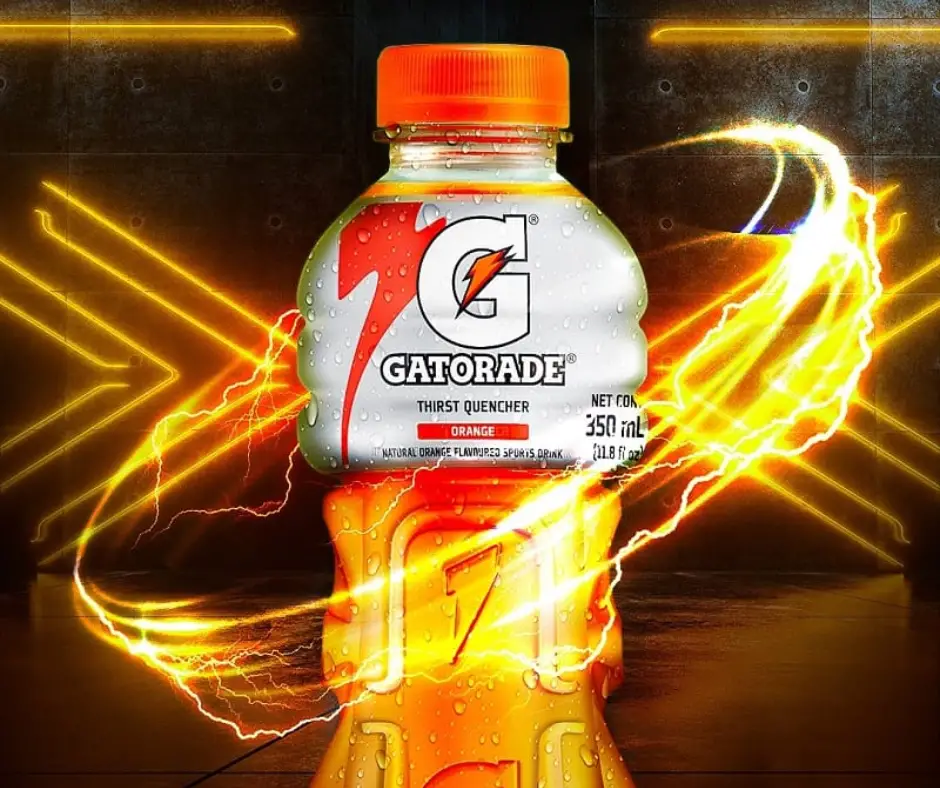Gatorade is a popular sports drink that has been around for decades. It was developed by the University of Florida’s College of Medicine in 1965 and has since become a staple in the sports and fitness world. The drink is designed to provide hydration and replenish electrolytes lost during physical activity. Many athletes and sports fans rely on Gatorade to keep them hydrated and energized during their activities. However, there is often confusion surrounding the ingredients that ‘Does Gatorade Have Caffeine?‘. In this blog post, we will explore this question and provide you with the information you need to make an informed decision about consuming Gatorade.

What Is Gatorade?
Gatorade is a sports drink containing water, sugar, salt, citric acid, sodium citrate, monopotassium phosphate, and flavoring. These ingredients work together to replenish lost fluids, electrolytes, and energy during exercise. The drink can be consumed during or after physical activity to help athletes stay hydrated and perform at their peak.
Purpose And Popularity Of Gatorade
The primary purpose of Gatorade is to help athletes stay hydrated and replenish electrolytes lost through sweat during exercise. Water alone does not contain enough electrolytes to replenish the body’s reserves before and after physical activity. Electrolytes are essential for maintaining fluid balance and muscle function, making them crucial for athletes performing at high levels.
Gatorade has become incredibly popular among athletes and sports enthusiasts due to its effectiveness in rehydrating and providing energy during intense physical activity. It is also widely recognized for its refreshing taste and wide range of flavors, making it a favorite choice for individuals engaged in various sports and fitness activities.
Gatorade is a go-to beverage for many athletes and sports enthusiasts as it helps them stay hydrated and replenish essential electrolytes lost during physical activity.
Does Gatorade Have Caffeine?
Gatorade, one of the most well-known sports drinks, does not contain caffeine. It was initially developed in 1965 at the University of Florida as a performance-boosting drink for their football team, the Gators. While Gatorade provides water and electrolytes, which are lost through sweat during exercise, it is not necessarily a better drink than water after sports. Industry-funded research studies tend to find favorable results for Gatorade, but independent studies have shown mixed results.
Unlike energy drinks with high amounts of caffeine, Gatorade does not act as a stimulant. However, Gatorade has recently introduced a caffeinated spin-off called Fast Twitch, which contains 200 milligrams of caffeine, equivalent to two 12-ounce cans of Red Bull. Fast Twitch aims to provide athletes with an extra boost before their workouts.
It is worth noting that Gatorade contains sodium and potassium, two electrolytes that help regulate the body’s fluid balance. While it replenishes lost electrolytes during exercise, it is important to consider the sugar content of Gatorade. Drinking excessive sugary drinks like Gatorade can contribute to tooth decay, weight gain, and high blood pressure. Therefore, it is important to consume sports drinks like Gatorade in moderation and consider the duration and intensity of your exercise.
If you are looking for a hydrating drink for running, choosing a sugar-free option that includes a balanced mix of electrolytes is recommended. Several alternatives are available that combine electrolytes and essential vitamins without added sugar and artificial sweeteners. It is important to prioritize hydration during running, but choosing the right drink for your needs is key.
Is Gatorade A High-sugar Drink?
Gatorade does contain sugar, but the amount varies depending on the flavor and size of the bottle. On average, a 20-ounce bottle of Gatorade contains around 34 grams of sugar, less than your average 20-ounce soda. It is important to note that Gatorade’s carbohydrate source is primarily simple sugars, making it high in calories. It is essential to consume Gatorade in moderation and be mindful of your overall sugar intake.
Ingredients In Gatorade

When understanding what is in Gatorade, it’s important to look closely at its main ingredients. Let’s break them down:
Water:
Water is the primary ingredient in Gatorade, serving as the base for the sports drink. This essential component helps rehydrate the body during physical activity.
Sugar And Dextrose:
Gatorade contains sugar and dextrose, which are carbohydrates that provide energy to the body. These sugars are derived from corn and contribute to the overall taste of the drink.
Citric Acid:
Citric acid is a natural acid in citrus fruits like lemons and limes. It gives Gatorade its tart taste and helps balance the sweetness of the sugars.
Natural And Artificial Flavors:
Gatorade incorporates both natural and artificial flavors to provide its distinct taste. Natural flavors are sourced from real food sources, while artificial flavors are created in a lab.
Salt And Sodium Citrate:
Salt and sodium citrate are added to Gatorade to replenish the electrolytes lost through sweat. Electrolytes are vital for proper muscle function and help maintain fluid balance.
Monopotassium Phosphate:
Monopotassium Phosphate is another ingredient in Gatorade that helps replenish electrolytes. This mineral plays a crucial role in muscle and nerve function, making it important for athletes during recovery.
Modified Food Starch:
Modified food starch acts as a thickening agent in Gatorade. It gives the drink a slightly thicker texture, enhancing the overall experience.
It’s worth noting that Gatorade does not contain caffeine. While the drink provides hydration and replenishment through electrolytes and carbohydrates, it does not include caffeine as an ingredient. This differentiates Gatorade from energy drinks, which often contain caffeine and other stimulants.
Understanding the ingredients in Gatorade allows individuals to make informed choices about their beverage options. Whether during exercise or as a way to rehydrate after a workout, Gatorade offers a refreshing and replenishing drink without adding caffeine.
By providing a balance of water, electrolytes, and carbohydrates, Gatorade supports hydration and recovery for athletes and active individuals. So the next time you reach for a Gatorade, you can enjoy it knowing you’re fueling your body without caffeine.
Which Gatorade Has Caffeine?

Gatorade’s newest addition to its lineup, Fast Twitch, is the brand’s first-ever caffeinated energy drink. This beverage, developed in partnership with the NFL and sports performance experts, contains 200 milligrams of caffeine, electrolytes, and B vitamins in each 12-ounce bottle. Fast Twitch will hit store shelves in February and be seen on the sidelines of NFL games in the coming weeks.
Unlike other energy drinks, Fast Twitch contains no sugar or carbonation. It aims to attract consumers seeking a caffeine boost without the negative health effects often associated with sugary carbonated beverages. The idea behind Fast Twitch is to provide athletes with an extra boost before their workouts, as it contains the right amount of caffeine to enhance exercise performance.
This new offering from Gatorade is part of the company’s broader push into the energy drink category, following its expansion of Mountain Dew into alcoholic and energy drinks. Gatorade’s parent company, Pepsi, has also made strategic moves in the energy drink space, including the launch of Mtn Dew Rise Energy and its investment in Celsius Holdings.
Fast Twitch’s release comes when the sports drink market, traditionally dominated by Gatorade, has seen slowing sales growth due to changing consumer tastes and concerns over high sugar and calorie content. Gatorade has responded by introducing options with more electrolytes and less sugar, such as G Fit, Gatorlyte, and Bolt24, which have reported double-digit revenue growth.
Which Gatorade Has No Caffeine?
Gatorade is a popular sports-themed beverage and food product line that replenishes fluids and electrolytes lost during intense physical activity. While Gatorade offers caffeinated products like Gatorade Energy Drink and Zero Energy Drink, options are also available without caffeine for those who prefer to avoid it. If you’re looking for Gatorade without caffeine, you’ll want to opt for the original formula Gatorade Thirst Quencher. This classic Gatorade contains no caffeine and is suitable for hydration during physical activities. It is important to check the label or product website for the most accurate information regarding the specific Gatorade flavors and caffeine content.
Is Gatorade Actually Hydrating?
Is Gatorade actually hydrating? This is a question that experts have debated. While Gatorade is often touted as a superior hydrating beverage to water, the truth is more nuanced. Clever marketing and misconceptions perpetuate the belief that sports drinks like Gatorade hydrate better than water. Gatorade does contain electrolytes, such as sodium and potassium, which play a vital role in maintaining hydration and helping the body function properly. However, whether these added electrolytes in Gatorade actually make a significant difference in hydration compared to water is still up for debate.
One study funded by Gatorade found that people who drank their product were better hydrated than if they drank water, mainly because they drank more fluids. In terms of pure hydration, drinking the same volume of water versus Gatorade would provide the same hydration level.
However, there are some potential benefits to drinking Gatorade or other sports drinks. Many people find flavored beverages more palatable than plain water, which can encourage them to drink more fluids during and after their workouts. Additionally, if you engage in intense physical activity for more than an hour and experience significant sodium loss in your sweat, a sports drink like Gatorade may help replenish those electrolytes and provide some energy in the form of carbohydrates.
On the other hand, it’s important to be cautious about the sugar content in Gatorade. A typical bottle of Gatorade contains a significant amount of sugar, which can spike blood glucose levels and potentially contribute to metabolic issues like type 2 diabetes if consumed excessively. For individuals who exercise for shorter durations or are focused on weight loss, consuming additional sugar and calories from sports drinks may not be necessary or beneficial.
Read more:
- Get The Facts: Does Strawberry Acai Have Caffeine?
- Does Big Red Have Caffeine? Unveiling the Facts
- Does BODYARMOR Have Caffeine?
- Does Fanta Have Caffeine?
- Does Gatorade Have Caffeine? Exploring the Popular Sports Drink’s Ingredients
Comparison With Other Drinks
Comparison Between Gatorade And Other Caffeinated Beverages
When choosing a beverage to stay hydrated and energized, it’s essential to understand how Gatorade compares to other caffeinated drinks on the market. Here’s a comparison of Gatorade with some popular drinks when it comes to ‘Does Gatorade Have Caffeine?’:
- Gatorade: Gatorade is a sports drink known for its electrolyte and carbohydrate content, designed to replenish fluids and provide energy during physical activity. It does not contain caffeine. Gatorade focuses on hydration and is often consumed by athletes and individuals engaged in prolonged exercise.
- Energy Drinks: Energy drinks like Red Bull, Monster, and Rockstar are known for their high caffeine content. These beverages typically contain stimulants like caffeine, taurine, and guarana, which provide an immediate energy boost. However, they may also pose health risks due to their high caffeine content and other stimulants, particularly for young adults.
- Coffee: Coffee is a popular caffeinated beverage made from brewed coffee beans. It contains caffeine, which provides a stimulating effect. The caffeine content in coffee can vary depending on the brewing method and the type of coffee beans used. While coffee can provide a quick burst of energy, excessive consumption may lead to caffeine dependency and potential side effects like jitters and sleep disturbances.
- Tea: Tea, such as black tea, green tea, and white tea, also contains caffeine. The caffeine content in tea is generally lower than that in coffee but can still provide a gentle energy boost. Tea also contains antioxidants and other beneficial compounds, making it a healthier alternative to energy drinks.
- Sports Performance Drinks: Some sports performance drinks, like Liquid IV and Skratch Labs Sport Hydration Drink Mix, offer hydration and electrolyte replenishment, similar to Gatorade. However, these drinks may also contain caffeine. It’s essential to check the label and choose the option that aligns with your specific hydration and energy needs.
Benefits And Drawbacks Of Consuming Gatorade
While Gatorade is a popular choice for athletes and individuals engaged in intense physical activity, it’s important to consider both the benefits and drawbacks of consuming this beverage:
Benefits:
- Replenishes Electrolytes: Gatorade contains electrolytes like sodium and potassium, which help restore the balance of minerals lost through sweat during exercise.
- Provides Energy: The carbohydrates in Gatorade can provide a quick energy source, especially during prolonged physical activity.
- Enhances Hydration: Gatorade’s composition enhances fluid absorption and maintains optimal hydration levels during exercise.
Drawbacks:
- High Sugar Content: Gatorade contains a significant amount of sugar, which may not be suitable for individuals with certain health conditions like diabetes or those watching their sugar intake.
- Artificial Ingredients: Some varieties of Gatorade may contain artificial flavors, colors, and sweeteners, which can concern individuals who prefer natural ingredients.
It’s important to note that Gatorade and other similar beverages should be tailored to individual needs and preferences. It’s always recommended to consult with a healthcare professional or a registered dietitian to determine the most appropriate hydration and energy options based on specific dietary and health considerations.
By providing this comparison and discussing the benefits and drawbacks, individuals can make an informed decision about consuming Gatorade. Remember, moderation and personal health considerations should always be considered when choosing any beverage.
Risks And Considerations
While Gatorade can be a beneficial sports drink for hydration and replenishing electrolytes, there are some potential risks and considerations to consider when consuming it. Here are a few points to consider:
Excessive Sugar Intake:
Gatorade contains significant sugar, with a 20-ounce bottle containing about 34 grams. Consuming excessive sugar can contribute to weight gain, tooth decay, and an increased risk of chronic diseases such as obesity and diabetes. It is important to consume Gatorade in moderation and be mindful of your overall sugar intake from all sources.
Sodium Content:
Gatorade is formulated to replenish electrolytes lost during physical activity, including sodium. While sodium is necessary for proper muscle function and fluid balance, consuming excessive sodium can lead to high blood pressure and other health issues. It is recommended to choose lower-sodium options or dilute Gatorade with water if you have concerns about sodium intake.
Caffeine Content:
While regular Gatorade does not contain caffeine, Gatorade offers a line of energy drinks called Fast Twitch that includes caffeine. These energy drinks contain varying amounts of caffeine, which can stimulate the body. It is important to read the labels and know the caffeine content if you consume Gatorade’s energy drink options.
Recommendations For Moderate And Appropriate Use:
To enjoy the benefits of Gatorade while minimizing potential risks, here are some recommendations:
- Use Gatorade during prolonged, intense physical activity lasting more than 60-90 minutes. For shorter workouts, plain water is usually sufficient for hydration.
- Limit Gatorade consumption to the recommended serving sizes and avoid excessive consumption.
- Consider lower-sugar options or diluting Gatorade with water to reduce overall sugar intake.
- Be aware of the sodium content and choose lower-sodium options if necessary.
- Pay attention to individual tolerance to caffeine, and if consuming Gatorade’s energy drinks, consume them in moderation and be mindful of the caffeine content.
It is always beneficial to consult with a healthcare professional or registered dietitian for personalized guidance and recommendations based on your needs and health conditions.
By being mindful of your Gatorade consumption and following these recommendations, you can enjoy the benefits of this popular sports drink while maintaining a balanced and healthy lifestyle.
FAQ Does Gatorade Have Caffeine?
Q: Does Gatorade have caffeine?
A: No, Gatorade does not contain caffeine. However, there are Gatorade Energy drinks that contain 35 mg of caffeine.
Q: Is Gatorade better than energy drinks?
A: Gatorade and energy drinks have different purposes. Gatorade is designed to replenish electrolytes and provide hydration during physical activity, while energy drinks are typically used for a quick energy boost due to their caffeine content.
Q: What are the ingredients in Gatorade?
A: The main ingredients in Gatorade include water, sugar, salt, electrolytes (such as sodium and potassium), citric acid, and flavorings.
Q: Can athletes benefit from adding caffeine to their sports drinks?
A: Caffeine can benefit athletes such as improved alertness and endurance. However, it should be consumed in moderation, and athletes should consult with a nutritionist or doctor before increasing their caffeine intake.
Q: Are there any risks of drinking too much Gatorade?
A: Excessive consumption of Gatorade due to its high sugar and sodium content can lead to adverse health effects such as an imbalance in electrolyte levels, muscle cramps, and high blood pressure. It is recommended to consume Gatorade in moderation and opt for water as the main source of hydration for individuals who are not engaged in intense physical activity.
Q: What are some popular alternatives to Gatorade for hydration during sports?
A: Some popular alternatives to Gatorade for hydration during sports include coconut water, water, bone broth, green tea, and electrolyte drinks that are low in sugar and artificial sweeteners.
Q: Is it better to avoid caffeinated drinks?
A: Whether to avoid caffeinated drinks or not depends on the individual. While caffeine can provide energy and alertness for some people, it can cause dehydration, increase heart rate and blood pressure, interfere with sleep, and interfere with the absorption of certain vitamins and minerals. It is important to consume caffeine in moderation and be aware of its potential effects on the body.
Conclusion
Recap Of The Key Points Discussed
Throughout this blog post, we have explored the question, ‘Does Gatorade Have Caffeine?’. Here are the key points that have been discussed:
- Gatorade is a popular sports drink that helps hydrate and replenish electrolytes after vigorous physical activity.
- Gatorade does not contain caffeine. It is formulated with electrolytes, carbohydrates, and other nutrients to support hydration, energy, and recovery.
- Unlike energy drinks and beverages like Coke, which contain caffeine, Gatorade provides a caffeine-free option for those seeking an energizing beverage.
- Gatorade has high sugar content, with a 20-ounce bottle containing around 34 grams. It is important to consume Gatorade in moderation, especially for individuals watching their sugar intake.
Final Thoughts On Gatorade And Its Caffeine Content
Gatorade is popular for athletes and sports enthusiasts who want to stay hydrated and replenish essential nutrients during and after exercise. It does not contain caffeine, making it a suitable option for those who prefer caffeine-free beverages.
However, it is essential to remember that Gatorade does have high sugar content, so it should be consumed in moderation; for individuals with specific dietary needs or those concerned about sugar intake, alternatives, and healthier options are available.
Ultimately, choosing Gatorade and other beverages depends on personal preference, individual needs, and specific circumstances. It is always advisable to read the labels and compare the ingredients to make an informed decision.
Now that you better understand Gatorade and its caffeine content, you can choose the right beverage to support your active lifestyle. Remember to prioritize hydration and consider your unique needs and preferences.
References

James Robinson loves coffee and blogging all about coffee. His blog is full of informative posts about the best ways to enjoy coffee and the many different types of coffee out there. He also shares recipes for delicious coffee-based dishes, and his followers can always count on him to offer tips on how to improve their coffee-making skills.
